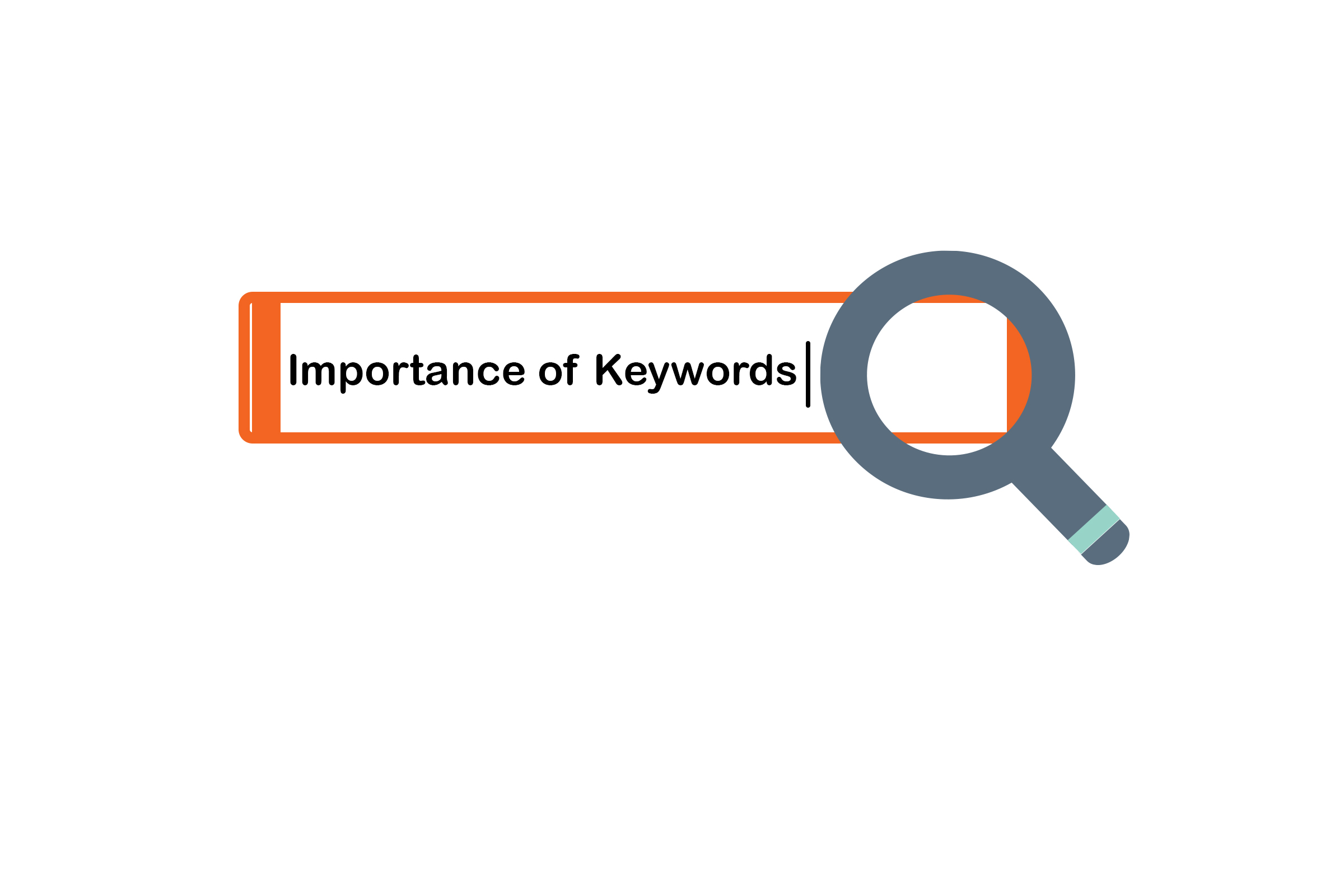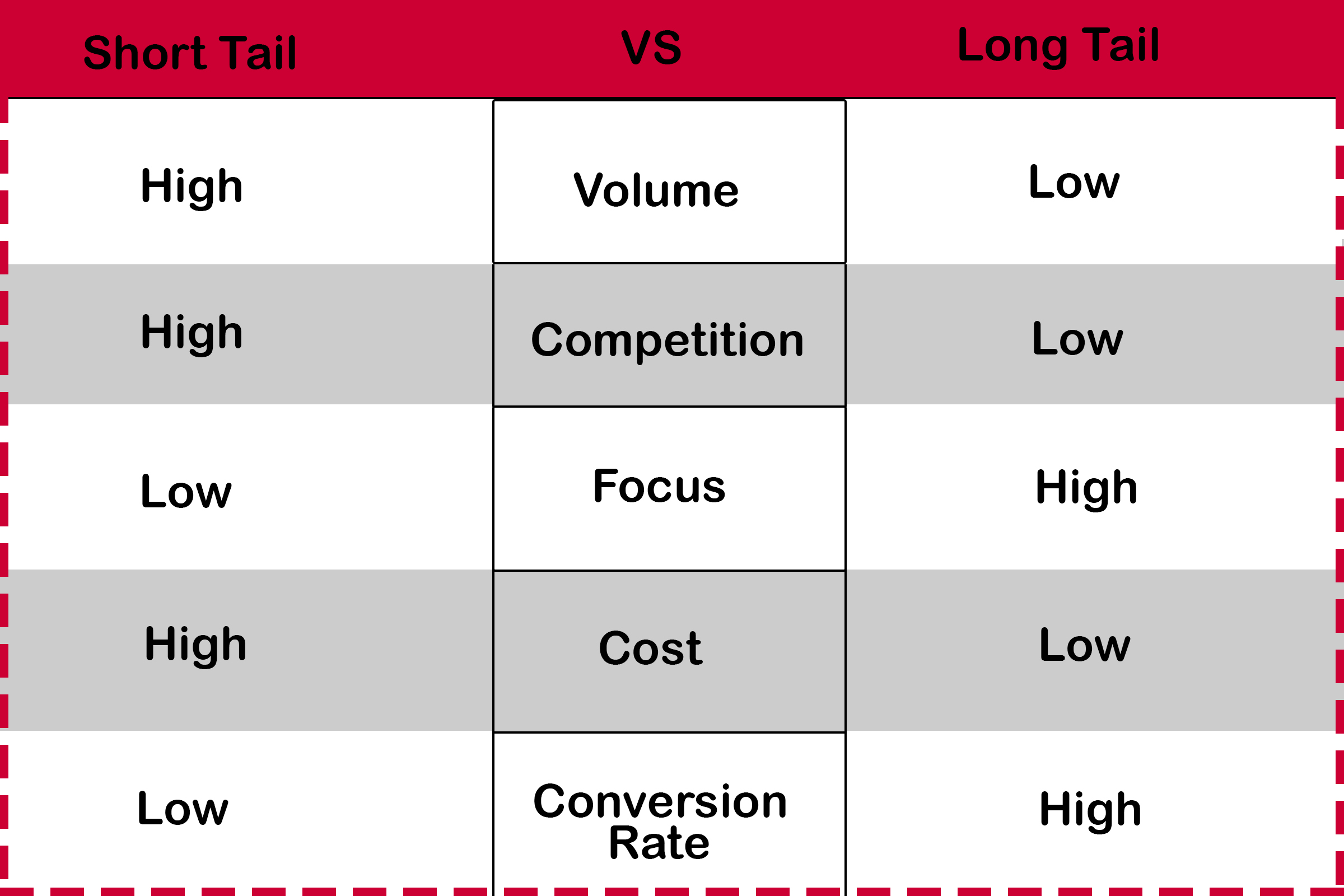What are Keywords?
Keywords are the words and phrases that people use to find what they’re looking for in search engines. It’s important to remember that keywords fall into two main categories better known as long tail keywords vs short tail. For short tail it can be a single word or a complete phrase for a long tail keyword.
Sometimes a keyword can even be a whole query or a question. As a technique, such keywords can also be very helpful because they usually directly match what people search for on google.
Keywords are one of the most essential aspects of Search Engine Optimization. Whether you are a blogger or just someone trying to do blog marketing for your small business you must understand how people search for the products, services, or information that you are providing and make that information simple for its readers to locate; otherwise, they will end up on one of the many other pages that show up on their Search Engine Ranking. Using the right keywords to optimize your content can help your website rank higher than its competition.
Keywords are inextricably linked with SEO; being the base of almost all other SEO activities. It will be well worth your time and money to ensure your SEO keywords are well-organized and highly relevant to your target audience.
Why are keywords important?
 The importance of keywords and phrases for a business or blog website is that they help your website rank high on SERP’s (Search Engine Ranking Pages) to be easily found early by your readers and prospects; when they search for those keywords in the Google search bar.
The importance of keywords and phrases for a business or blog website is that they help your website rank high on SERP’s (Search Engine Ranking Pages) to be easily found early by your readers and prospects; when they search for those keywords in the Google search bar.
Keyword optimization is essential for various reasons; adequately utilizing keywords helps explain to Google bots what that web page is all about; make them better display your website against specific queries.
Google and other search engines have over 200 ranking factors that can either push your website to the top of the search engine results page (SERP) or push it to the bottom.
You should understand that not all of those factors are equally important, but some of them are more important than others. Keywords are one of those factors that contribute significantly to a website’s ranking.
Ranking for just random keywords is not what you should do. Instead, you must aim to rank for relevant, high-quality keywords (with Low Keyword Difficulty and High Search Volume) to generate a significant flow of visitors that would increase your brand exposure and sales.
Types of Keywords:
Keywords are classified into two types:
1) Long-tail keywords
2) Short tail keywords
Short Tail Keywords
Short tail keywords usually contain only one (eg. Backlinks) or max two words (eg. Digital Marketing). They are a broader search term/topic.
People search for short-tail keywords more frequently as in most cases that is where they start and then narrow down their search by adding more words to the broad niche keyword making it a long-tail keyword.
Long-tail keywords have a lower search volume due to their specific search intent. On the other hand, the short-tail keywords have a much higher search volume which actually makes them a lot more difficult to rank on due to their higher keyword difficulty.
Short-tail keywords are more competitive in online paid advertising; because marketers bid to have their website displayed at the top of SERPs for the most popular and searched keywords, mostly short-tail.
Long-Tail Keywords
Long-Tail Keywords can be anywhere between three (eg. Backlink Best Practices) to five (eg. digital marketing agency san diego) words long.
These keywords have a low search volume, but they also have a lower competitiveness level. These attributes make long-tail keywords work as focus keywords when composing a blog article.
Pinning advertising to long-tail keywords can result in a higher ROI. You may get better results if you bid on several relevant long-tail keywords rather than waste your budget on one or two highly competitive short-tail keywords or phrases.
Long-tail keywords can generate a decent and more-targeted search volume with less competition which results in higher conversions.
Some More Examples of Longtail and Short tail keywords:
“Bag” is a short tail keyword, while “bags for girls college” is the long tail.
Basic Comparison Long Tail vs Short Tail Keywords

Short-Tail Keywords:
Volume: High
Short tail keywords will always outnumber long-tail keywords in terms of volume. The higher the search volume, the shorter the keyword. You’ll undoubtedly get a lot of organic visitors if you can rank for a short tail keyword.
Competition: High
Since short-tail keywords have such a high amount of searches, it’s no surprise that everyone wants to rank for them. The rewards are substantial. The short-term keyword market is competitive.
Cost: High
In addition to the time and effort required to rank for long-tail keywords, the cost of short-tail keywords will continue to rise. Using Google AdWords to target long-tail keywords for your most popular search queries will cost a lot of money and your visibility will cost more because of the strong demand for these types of queries.
Focus: Low
There’s also the problem that your search isn’t “targeted.”
Conversion Rate: Low
The most common criticism levelled about short tail keywords is that they do not generate a high volume of leads. People often go for a short-term keyword intent. Even if you earn 10,000 searches and 100 clicks, your conversion rate may only be one or two customers.
Long-Tail Keywords
Volume: Low
When talking about long-tail keywords, it’s essential to consider the volume. You get less traffic from long-tail keywords which might just be a terrible thing for some businesses.
Competition: Low
When you choose a long-tail keyword, the competition is low compared to a short-tail. If you’re selling a common product like ‘ladies handbags’ then you’ll be competing against a good number of other sellers. But if you have a variety of ‘red ladies handbags’ and you try to rank on that phrase then you will face less competition and get specific traffic of people searching for ‘red ladies handbags’.
Focus: High
Like the low competition, the targeted nature of the search traffic you receive will be ideal for most businesses selling specific products like ‘red ladies handbags’.
Cost: Low
Another advantage of less traffic in long-tail keywords is that because of lesser competition you will spend less on them. Google AdWords has lowered the cost for searches targeted using more words.
Conversion Rate: High
Conversion rates are higher with long-tail keywords. You will have a much simpler time converting the traffic you generate if you have individuals looking for precise information or something specific. Long-tail keywords have a higher conversion rate than short-tail keywords, although their results may vary depending on your product and your location.
Why Do You Need Both? Long Tail & Short Tail Keywords
Learning how to blend long tail and short tail keywords effectively will help you get the best results from your digital marketing strategies.
In terms of SEO, both seed keywords and long-tail keywords play a part. Here’s how to double-check that you’re selecting the correct option:
1. Make use of seed keywords to direct your SEO strategy
In the debate over long tail vs short tail keywords, consider your “long tail” terms to be the narrow focus points in your content, whereas your seed terms are the “broad” categories you must consider. Both play a role in your path to a stronger online presence, but you’ll need to start with broad terms to help you navigate where you’re going with your campaigns.
2. Understand how to use both long tail and short tail keywords:
Keyword research is only the first step in developing an effective keyword strategy. You must also determine how to effectively place your keywords throughout your online campaigns. Keyword stuffing can be difficult because Google may penalize you for “spams” content if you use your terms too frequently.
You can combine long tail and short tail keywords in a variety of ways in your content marketing strategy. Short tail keywords also work well in alt tags, meta tags, and social media updates.
3. Always provide what your customers require:
Whether you’re using short tail or long-tail keywords, your primary goal should always be to provide your customers with what they’re looking for online. Your short seed keywords will help to direct your ideas by providing categories to investigate. On the other hand, long-tail keywords will enable you to dive deep into topics and create more targeted content for the target audience.
Finally, keywords are an essential part of any SEO plan, and it’s necessary to understand that there are several various kinds to evaluate. For most businesses, short tail keywords will serve as a framework for the rest of your SEO strategy, as well as a guide to keeping your content campaigns consistent. Your seed terms will also serve as sources of inspiration for long-tail content marketing.
While short-tail keywords are helpful for organic traffic generation, long-tail keywords allow you to connect with your targeted audience more emotionally. You’ll need to learn how to use both if you want to stay one step ahead of the google search terms.
Conclusion
In the end, you must do what is best for you and your small business. Of course, you want to save money while also having as significant a web presence as possible. Short tail keywords are tough to rank in today’s world of digital marketing. As previously discussed, it is nearly impossible for small or even medium-sized businesses to compete. However, if you want a higher conversion rate, lower cost, less competition, and a higher volume of people who are specifically interested in what you’re selling, you should play the long-tail phrases game.


